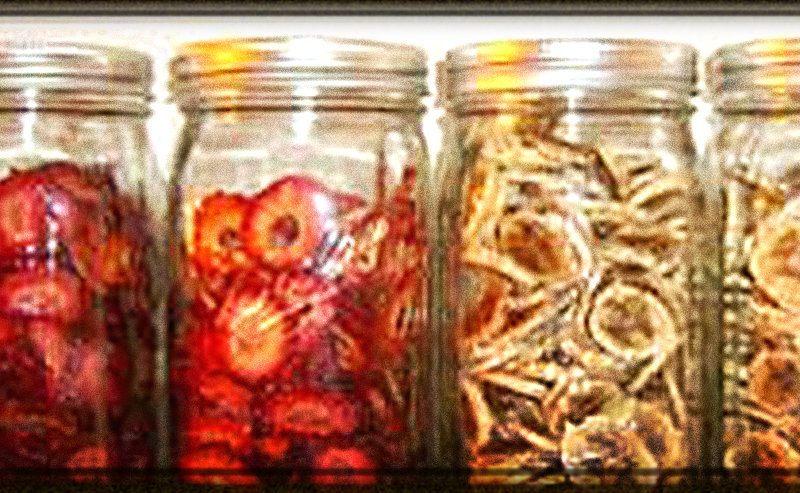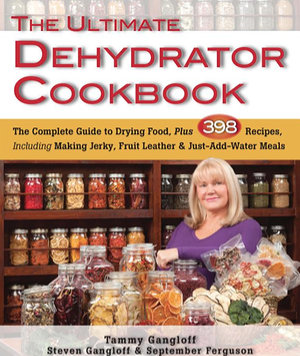Dehydrated Food Shelf Life – What Affects It, and My Experience

There are several things that will affect your dehydrated food shelf life. My biggest problem is consuming my home dehydrated foods before I ever find out what the shelf life could be! <grin>
4 Factors That Affect Home Dehydrated Food Shelf Life
Temperature
Moisture
Oxygen
Light
Temperature affects shelf life
Storage temperature has a significant affect on shelf-life. The cooler the better!
For every reduction in storage temperature of 10-degrees-C (18 F) the expected shelf life will double! That is pretty significant.
A storage environment of 54 F instead of 72 F will double a 1 yr shelf life expectancy to 2 yrs. This might be the difference between storing your food upstairs (where it’s usually warmer) or downstairs in the basement (assuming you have a basement). So keep that in mind…
A storage temperature of 90 F instead of 72 F will halve the expected shelf life.
For more information, the following article describes this in more detail:
[ Read: Temperature Versus Food Storage Shelf Life ]
Moisture affects shelf life
The process of dehydrating removes most of the moisture from foods while retaining much of the nutritional value and flavor. It is a great method to preserve fruits and vegetables for later consumption off-season.
Fruits will typically contain about 75 percent moisture when fresh. They should be dehydrated to an approximate 20 percent moisture level, which is the point at which they become leathery and pliable. Apparently it is okay for fruits to be dried to this ‘pliable’ level rather than a lower ‘brittle’ moisture level because the natural sugars and acids in fruit act as an added preservative.
Vegetables should be dehydrated to a moisture level of at least down to 10 percent (lower is better). Or to the point at which they become crisp and brittle, and will break or snap if bent.
In my opinion, the best home food dehydrators on the market right now include the following:
Nesco Food Dehydrator
(view on amzn)
Excalibur Food Dehydrator
(my preferred choice)
Oxygen affects shelf life
Oxygen (oxidation) will interact with, and break down fats and proteins resulting in poor flavor and eventual spoilage. Fruits and vegetables only have small amounts of fat and protein but will still oxidize over a period of time when stored in an environment containing oxygen. This may be a particular concern if you are storing your dehydrated foods for “long term” (years).
You might consider using a vacuum-sealer with vacuum seal bags, or glass jar storage (there’s also a Jar Sealer attachment to remove the air).
FoodSaver Automatic Vacuum Sealing System
(view on amzn)
Light affects shelf life
Photons from light will also eventually break down fats and proteins as well as vitamins in the food, resulting in poor flavor and possibly eventual spoilage.
Therefore it is preferable to store foods in dark places or in opaque containers.
Dehydrated Fruit and Vegetable Shelf Life
First, a quick note about shelf life versus ‘Best by’ dates…
Shelf life and ‘Best by’ dates are different things.
For more information on “Best by” or “Use by” dates that you see on grocery store foods, read the following article:
[ Read: Use-by, Best-by, and Sell-by Food Expiration Dates ]
In short, “Best by” dates on food packaging labels is defined as the maximum date which food will still taste its best and retain most all of its nutritional value, and is usually a date long before actual spoilage.
The ‘Use-by’ and ‘Best-by’ dates are intended for consumer use.
It is the date the manufacturer deems the product reaches peak freshness.
It is NOT a date to indicate spoilage, nor does it necessarily signal that the food is no longer safe to eat.
Having said that, “shelf life” is subjective and variable, depending on storage factors listed above, and the food itself.
Shelf Life of Dehydrated Food
FRUITS
Very generally speaking, ‘official’ wording regarding home dried fruits will have an approximate typical minimum shelf life of 6 months to 1 year.
That said, the shelf life may be drastically lengthened upon ideal storage conditions as well as the dehydrated dryness level of the food itself (the drier it is, the longer it will store).
Note that professionally dried foods will typically store longer due to having achieved a very low moisture level with professional equipment.
VEGETABLES
The shelf life of home dried vegetables will vary depending on the vegetable itself and how dry it is (% moisture content). However a typical shelf life expectancy should be at least up to one year. That said, it is possible to achieve MANY years of shelf life with good storage practices.
Dehydrated vegetables processed with professional equipment specifically for long term storage will be prepared, dried, and packaged in processes that bring moisture content down to as low as 3 percent. This will store much, much longer (I’ve seen claims of 25 years in #10 cans if stored properly).
My Experience With Home Dehydrated Food Shelf Life
My experience has been excellent of late. Generally speaking, I have not had any problems with properly stored dehydrated foods that have been sitting around for many years. The oldest jar I found one time was about 6 years old (onions)
[ Read: How to Dehydrate Onions ]
However many years ago when we first started dehydrating vegetables, we did have some issues.
We tried storing some of the vegetables in Zipolc bags. We kept them in a dark environment (in a room temperature closet). About 6 months to 1 year later we noticed that some of it didn’t look or seem quite ‘right’. So we tossed it. It had visibly taken on a less-than-ideal appearance.
Since then we’ve learned to store our dehydrated foods either in vacuum-sealed bags or in glass jars (Mason jars). Actually we most often use glass canning jars.
Lets hear your further comments on your own success stories (or lessons learned) regarding dehydrated food shelf life and storage. This article was originally published years ago (although I’ve recently updated it), so there are existing comments from that time-frame.
This is THE most popular dehydrator cookbook:
The Ultimate Dehydrator Cookbook
(view on amzn)

